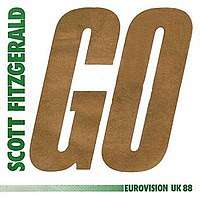Go (Scott Fitzgerald song)
"Go", written and composed by Julie Forsyth, who was a member of the Pop Group Guys 'n' Dolls and is the daughter of English entertainer Bruce Forsyth, was the United Kingdom's entry at the Eurovision Song Contest 1988, performed by Scott Fitzgerald. Bruce Forsyth and his wife were in the audience at the contest, supporting their daughter.
 CD cover | |
| Eurovision Song Contest 1988 entry | |
| Country | |
| Artist(s) | Scott Fitzgerald |
| Language | |
| Composer(s) | Julie Forsyth |
| Lyricist(s) | Julie Forsyth |
| Conductor | Ronnie Hazlehurst |
| Finals performance | |
| Final result | 2nd |
| Final points | 136 |
| Entry chronology | |
| ◄ "Only the Light" (1987) | |
| "Why Do I Always Get it Wrong?" (1989) ► | |
Fitzgerald won the right to perform at Dublin by winning the UK national final, A Song for Europe, where he was the eighth singer to perform. Fitzgerald was also the first singer to be chosen to represent the United Kingdom via a national telephone vote. In Dublin, the song was performed fourth on the night, after Finland's Boulevard with "Nauravat silmät muistetaan", and before Turkey's Mazhar-Fuat-Özkan with "Sufi."
At the end of judging that evening, "Go" took the second-place slot with 136 points. Turkey, Belgium and Italy awarded their 12-point designations to the UK that evening. In one of the closest voting rounds up to that time, the UK lost the competition by one point to Switzerland's representative, Canadian singer Celine Dion, with her song "Ne Partez Pas Sans Moi." According to author and contest historian John Kennedy O'Connor, this was the closest contest yet, with the winning margin being just 0.73%.[1] The strong showing in the 1988 contest was an indicator of things to come for the United Kingdom, as it would become the first of eleven straight Top Ten placings in the Contest, and the first of four second-place finishes in the next six years.
In a departure from the past two years, an easy listening ballad was on offer this year, telling the story of two former lovers meeting by chance. Fitzgerald, in the role of the lovesick man, relates the sad story; his former lover had left him years before for another man, and now that she has returned, so has all the sorrow he felt.
After Eurovision, the song placed at No. 52 on the UK Singles Chart. The song was later covered by Russian singer Philipp Kirkorov.[2]
Charts
| Chart (1988) | Peak position |
|---|---|
| UK Singles Official Charts Company[3] | 52 |
References
- O'Connor, John Kennedy. The Eurovision Song Contest - The Official History. Carlton Books, UK. 2007 ISBN 978-1-84442-994-3
- "Russia's Philipp Kirkorov: I would write a Eurovision song for Julia Samoylova if she asked me". wiwibloggs. 1 August 2017. Retrieved 17 May 2019.
- "The UK's highest charting Eurovision stars revealed!". Retrieved 2015-05-10.
| Preceded by "Only the Light" by Rikki |
United Kingdom in the Eurovision Song Contest 1988 |
Succeeded by "Why Do I Always Get it Wrong?" by Live Report |